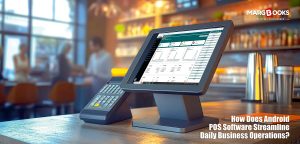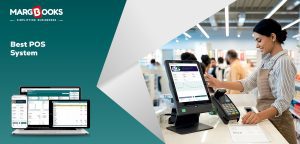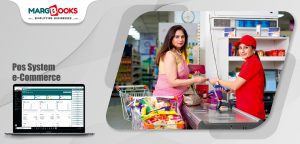In the bustling world of supermarkets, efficiency is key. From managing inventory to ensuring smooth transactions at the checkout, every aspect of the operation needs to be streamlined for success. And at the heart of this efficiency lies the Point of Sale (POS) system. In this blog, we’ll explore the importance of a reliable POS system for supermarkets and how it can simplify operations while enhancing customer experience.
What is a Supermarket Point of Sale System?
Let’s start with the basics. A Point of Sale system, often abbreviated as POS, is a combination of hardware and software that allows businesses to complete sales transactions. In the context of a supermarket, a POS system typically includes a cash register, barcode scanner, receipt printer, and software to manage inventory, sales, and customer data.
Why is a POS System Important for Supermarkets?
- Efficient Checkout Process: Long checkout lines can deter customers and lead to lost sales. A POS system speeds up the checkout process by accurately scanning items and processing payments quickly.
- Inventory Management: Supermarkets deal with a wide range of products that need to be constantly monitored for stock levels. A POS system tracks inventory in real-time, alerting staff when it’s time to reorder popular items and preventing stockouts.
- Sales Reporting and Analytics: Understanding sales trends and customer behavior is essential for making informed business decisions. A POS system generates detailed reports on sales, allowing supermarket owners to identify top-selling items, peak hours, and other valuable insights.
- Enhanced Customer Experience: A smooth checkout process and personalized service can leave a lasting impression on customers. With features like loyalty programs and integrated customer relationship management (CRM), a POS system helps supermarkets build stronger relationships with their clientele.
Key Features to Look for in a Supermarket POS System
- Barcode Scanning: A reliable barcode scanner is essential for quickly and accurately scanning items at the checkout counter. Look for a POS system with fast scanning capabilities to minimize wait times for customers.
- Inventory Tracking: Real-time inventory tracking ensures that supermarkets always have the right products in stock. The POS system should automatically update inventory levels as items are sold and generate alerts for low-stock items.
- Integration with Other Systems: To maximize efficiency, choose a POS system that integrates seamlessly with other software solutions used in the supermarket, such as accounting software, online ordering platforms, and supplier databases.
- User-Friendly Interface: The user interface of the POS system should be intuitive and easy to navigate for both staff and customers. Training time should be minimal, allowing supermarket employees to quickly adapt to the new system.
- Security Features: Data security is a top priority for supermarkets, especially when processing customer payments. Look for a POS system that complies with industry standards for data encryption and offers features like user authentication and transaction logging.

Choosing the Right POS System for Your Supermarket
With so many options available in the market, selecting the right POS system for your supermarket can seem daunting. Here are some tips to help you make an informed decision:
- Assess Your Needs: Consider the specific requirements of your supermarket, such as the size of your inventory, number of checkout lanes, and budget constraints. Look for a POS system that can accommodate your current needs while allowing room for future growth.
- Read Reviews and Testimonials: Take the time to research POS systems online and read reviews from other supermarket owners. Pay attention to feedback regarding reliability, customer support, and ease of use.
- Request Demos: Many POS vendors offer free demos or trial periods for their software. Take advantage of these opportunities to test drive different systems and see which one best fits your supermarket’s workflow.
- Consider Long-Term Costs: In addition to the upfront cost of purchasing a POS system, consider the long-term costs associated with maintenance, upgrades, and support fees. Choose a vendor with transparent pricing and flexible payment options.
- Get Input from Staff: Your frontline staff will be the ones using the POS system on a daily basis, so it’s essential to involve them in the decision-making process. Seek feedback from employees about their preferences and any pain points they currently experience with the existing system.
Factors to Consider When Implementing a Supermarket POS System
Implementing a new POS system is a significant undertaking for any supermarket. Here are some additional factors to consider to ensure a smooth transition:
- Training and Support: Adequate training is essential to ensure that all supermarket staff are comfortable using the new POS system. Look for a vendor that provides comprehensive training materials and ongoing support to address any issues that may arise.
- Customization Options: Every supermarket is unique, so it’s essential to choose a POS system that can be customized to meet your specific needs. Whether you need to add custom fields for product information or tailor reports to suit your business requirements, flexibility is key.
- Scalability: As your supermarket grows, your POS system needs to grow with it. Choose a solution that can scale seamlessly to accommodate an increasing number of products, checkout lanes, and customers.
- Cloud-Based vs. On-Premises: Consider whether a cloud-based or on-premises POS system is the right choice for your supermarket. Cloud-based systems offer the advantage of remote access and automatic updates, while on-premises solutions provide greater control over data security.
- Hardware Compatibility: Before investing in a new POS system, ensure that it is compatible with your existing hardware infrastructure. This includes barcode scanners, receipt printers, and any other peripherals you use in your supermarket.
- Mobile Integration: Mobile POS solutions allow supermarket staff to complete transactions from anywhere in the store, reducing wait times and improving customer service. Look for a POS system that offers mobile integration for added flexibility.
- Compliance Requirements: Supermarkets are subject to various regulations regarding data security and payment processing. Choose a POS system that complies with industry standards and regulatory requirements to avoid potential fines and penalties.
The Future of Supermarket POS Systems
As technology continues to evolve, so too will supermarket POS systems. Here are some trends to watch for in the future:
- Contactless Payments: With the rise of mobile wallets and contactless payment methods, supermarkets will increasingly adopt POS systems that support these technologies for a faster and more convenient checkout experience.
- Artificial Intelligence: AI-powered POS systems can analyze sales data in real-time to identify patterns and predict future demand. This allows supermarkets to optimize inventory management and pricing strategies for better profitability.
- Integration with Online Platforms: As more consumers turn to online shopping, supermarket POS systems will need to integrate seamlessly with e-commerce platforms to provide a unified shopping experience across all channels.
- Enhanced Personalization: POS systems will leverage customer data to offer personalized promotions and recommendations based on individual shopping habits and preferences, further enhancing the customer experience.
- Augmented Reality: AR technology can be used in conjunction with POS systems to provide shoppers with interactive product information and virtual try-on experiences, making the shopping process more engaging and immersive.
Conclusion
A reliable POS system is essential for the success of any supermarket. From streamlining checkout processes to optimizing inventory management, the right POS system can help supermarkets operate more efficiently and provide a better experience for customers. By carefully considering factors such as customization options, scalability, and future trends, supermarket owners can choose a POS system that meets their current needs while preparing them for the challenges of tomorrow.
Also Read:
Advantages Of Using Online Billing software in 2024
What Kind of Billing Software Do Store Owners Have for Billing?
Financial Management Made Easy With Billing and Invoicing Software
What is A Web Based Billing and Invoicing Software
Frequently Asked Questions
What is a point of sale system?
A point of sale system, or POS system, is a computerized system that helps supermarkets manage sales transactions, track inventory, and process payments.
How does a POS system help supermarkets?
A POS system helps supermarkets by making checkout faster, keeping track of what’s in stock, and providing reports on sales and customer information.
What hardware is needed for a POS system in a supermarket?
In a supermarket, a POS system typically includes a cash register, barcode scanner, receipt printer, and sometimes a card reader for credit and debit card payments.
Can a POS system handle different types of products?
Yes, a POS system can handle a wide variety of products, including groceries, household items, and even non-food items like clothing or electronics.
How does a POS system track inventory?
A POS system tracks inventory by recording each item that is sold and subtracting it from the available stock. It can also alert staff when items need to be reordered.
Is a POS system easy to use for supermarket employees?
Yes, most POS systems are designed to be easy to use. They typically have simple interfaces and can be customized to match the supermarket’s workflow.
Can a POS system accept different payment methods?
Yes, modern POS systems can accept various payment methods, including cash, credit cards, debit cards, mobile wallets like Apple Pay or Google Pay, and even electronic benefit transfer (EBT) cards.
How secure is a POS system for processing payments?
POS systems are designed with security in mind and often use encryption to protect sensitive payment information. They also have features like user authentication to prevent unauthorized access.
Can a POS system generate reports on sales and customer data?
Yes, a POS system can generate reports that show sales trends, top-selling items, and customer purchasing habits. These reports help supermarket owners make informed business decisions.




